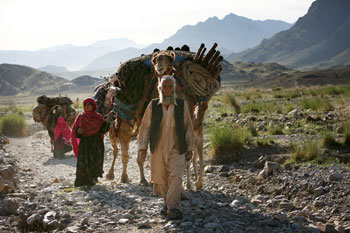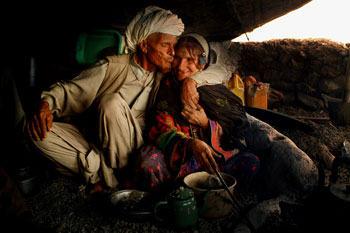 |
On the Kuchi's Path
October 2006
|
||||||||||||
|
It was very difficult to find a tribe that a journalist, Marie, and I could follow to make the trip from Pakistan into Afghanistan. They all thought it would be too dangerous for them.
Eventually we found one while we were buying a tent. There we met with two men from the Kuchi tribe. We were to meet them the following day in one of the tribal areas of Pakistan. Because foreigners are not allowed in Pakistani tribal areas, we went and bought ourselves 30-year-old authentic Kuchi dresses to blend in.
Just to get to the border of Afghanistan, it takes the Kuchis 24 hours of walking through the dangerous mountains of the tribal agency. It is so dangerous that the tribe cannot take the risk of stopping on the way. So, the women, children, old people and even the baby goats go on a bus to cross the border. Once there, they put up the camp and wait for the men with the camels, goats and sheep to walk without stopping.
The journalist and I went on the bus with the ladies. As we crossed the border, the police stopped the bus and found us hidden under our veils, disguised as Kuchis. They took us off the bus. The ISI interrogated us for many hours before letting us go to rejoin the tribe.
We broke the ice with the women of the family by offering them and their children chocolates and other sweets. Most of them had never tried it before and made funny faces as they discovered these new tastes.
Our camp was really close to the American Special Forces Camp. Suddenly, we heard a loud explosion. One of the kids had thrown a rock that had exploded a land mine. Luckily nobody was hurt.
A few hours later, the Special Forces surrounded the camp. Somebody had told them about two strange foreigners, probably spies, who were pretending to be Kuchis. Panic all around—babies crying, women rushing under their tents, etc. We had to explain why we were there. The soldiers promised that they would not bother us again. We got a lot of strange looks from our adopted family after that. Then, a few hours later, three pickup trucks filled with Special Forces troops rushed into the camp for the same reason. Fuming, we had to go through the same explanation and beg them to not come back because they were compromising the trust we had developed with the Kuchis.
We woke up at 4:30 a.m. to meet the men and the herd at the border. They avoided the border illegally by going through the mountains. It was a magical vision to see all these camels, goats, sheep and men approaching in the foggy morning.
In the beginning, the Kuchis did not want us to stay with them because they were afraid that we would cause them a lot of trouble. But we were determined and insisted on staying. We went to buy for each family in the tribe some sugar, tea and oranges. We asked the chief of the tribes to call a shura, a meeting, including every head of family and us. We gave our gifts and tried to explain why we were there and that we needed to follow them over several days.
Marie, the journalist, and I decided that we were going to cook a dinner for our family—Farook, his wife and children. On the menu: eggs, onions and tomatoes prepared together in the same pan. We went to fetch some wood for the fire and to borrow a big pan. Soon we had everyone watching the two white females cooking. Proud of our mixture that actually smelled rather good, we served the women in their tent and the men in our tent, chatting with our 'fixer.' We liked it, they didn't…. After a session of smoking cigarettes, looking silently eye-to-eye with the three males of the family sitting in our tent, we immediately went to sleep when they finally left us.
We left with the tribe at dawn after breaking camp—taking the tents down, packing, loading the camels, then running after the baby goats to give them some milk for the long walk.
Because we were going to go through many villages with bad reputations we had to try to melt into the tribe. We wore our uncomfortable dresses, plastic shoes similar to theirs and walked with the women. The illusion did not last long; our white faces among their tanned faces were noticeable and attracted much unwanted attention. Our family was very tense. They knew that the other families of the tribe would be angry with them because of the problems we were creating for them. We kept a very low profile during the evening and went to bed early.
For a few days all went smoothly, each day a new camp nearer to the south of Kabul. Every night we had more and more men join us under our tent for what now seemed the traditional chatting session. This was fine until the women got jealous and forbade their husbands to come to see us. Everything plunged into hell: the women refused to give us food, to talk with us or even to have their pictures taken. The men got angry with their women, and a few slaps were exchanged between the men and women. Things continued to get more and more tense as the days went on.
The Kuchis were now close to Tora Bora, which has a reputation of being one of the biggest opium markets of the country. We often heard gun battles in the distance as we were going to sleep. The families were getting more upset because all of us could easily have been targeted by the Taliban or some thieves. Even so, the people had Kalishnikovs with them and anyone would have to be really crazy or desperate to attack this Kuchi tribe.
Marie and I had to fight everyday to stay with them just one more night, one more day. Then one day, Farook, our protector, came to see us and asked us to leave. The other families of the tribe were, apparently, planning to steal everything we had and abandon us with nothing in the middle of nowhere in this unfriendly area. We had no choice but to go. We shared an emotional last lunch with Farook's family. And then we left.
I will remember this trip all my life. Sharing the life of these nomads, some of the last ones on the planet, was a real gift, unforgettable.
© Véronique de Viguerie
Dispatches are brought to you by Canon. Send Canon a message of thanks. |
||||||||||||
Back to October 2006 Contents
|
|




